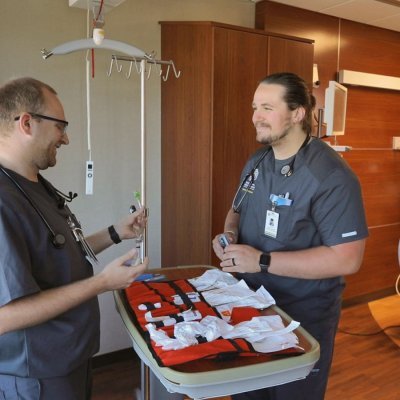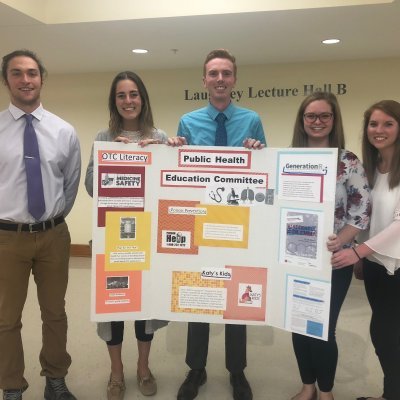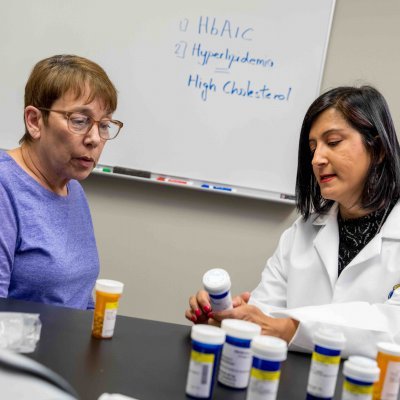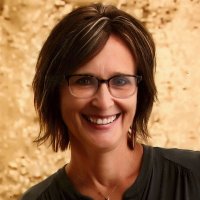
About BREATHE-SD
The COVID-19 pandemic has highlighted the need to strengthen the respiratory therapy and public health workforce across the country, including here in South Dakota. The innovative BREATHE-SD program works to meet that need. BREATHE-SD (Bringing Resources, Education, Awareness, Training, Holistic care and Empowerment to South Dakota) will leverage respiratory therapists, public health professionals and other allied healthcare professionals to meet rural public health workforce needs and expand South Dakota’s public health capacity by supporting recruitment, job placement, training and worker development in rural communities.

As part of this project, the SDSU respiratory care program will be able to increase its student capacity from 24 to 40 A.S. students per year and provide scholarship opportunities to students in the program. The project will also create opportunities for SDSU respiratory care program students to complete clinical rotations at medical centers located in the project’s three target rural counties: Beadle, Lake and Brookings. Through these rotations, our future respiratory therapists will gain valuable experience working in rural communities. The program will also encourage cross-training and provide scholarships opportunities for respiratory therapists, public health workers, and others who choose to pursue a public health certificate.
Additionally, the project will include an awareness campaign focused on increasing awareness of respiratory therapy and public health professions among the public, including K-12 students. Finally, all awareness, recruitment, education and training efforts will emphasize rural and underserved populations in order to ensure care can be provided to those who need it.
BREATHE-SD is a $1.545 million project funded by the Health Resources and Services Administration (HRSA).

Forming a consortium that pools:
- Resources
- Expertise
- Infrastructure
- Developing and delivering innovative, flexible, and comprehensive respiratory care.
- Utilizing onsite training and apprenticeships in rural hospitals.
- Increasing the number of respiratory care graduates by 66%.
- Launching an awareness campaign focused on prevention and management of COVID-19 and long-term impacts of respiratory conditions.
- Increasing awareness of the services offered by team members.
- Raising awareness among K-12 students about respiratory therapy professions.
- Cross-training RTs, PH professionals, case managers, community health workers, paramedics, CNAs and medical assistants.
- Providing basic foundations training across disciplines.
- Developing training sessions, webinars and toolkits.
Patients will be able to access more holistic care through the consortium's efforts to:
- Cross-train practitioners.
- Develop shared resources and educational materials.
- Address social determinants of health.
- Restoring confidence and empowering current and future healthcare workers to provide high quality patient care.
- Reducing staff turnover rates and burnout by encouraging and equipping practitioners through education and training services.
- Offering learning opportunities to empower K-12 students to pursue health care professions, including respiratory therapy.
Scholarships
Two scholarships different scholarships are available through BREATHE-SD. One for students pursuing a degree in respiratory care and one for students pursuing a certificate in public health.
BREATHE-SD Scholarship for students pursuing the A.S. in Respiratory Care
Through BREATHE-SD, half-tuition scholarships are available to students pursuing an A.S. in respiratory care at SDSU.
All A.S. degree requirements also count toward the B.S. in respiratory care.
There is no separate application for the BREATHE-SD scholarship; simply apply to the A.S. in respiratory care and you will be automatically considered for the half-tuition BREATHE-SD scholarship.
BREATHE-SD Public Health Certificate Scholarship
BREATHE-SD Public Health Certificate Scholarship
The BREATHE-SD public health certificate scholarship covers half tuition for current and future healthcare workers to earn their public health certificate.
The public health certificate enables you to expand your knowledge of public health and understand the application of public health concepts to clinical and related practices. Courses explore fundamental concepts in public health theory, epidemiology and application of public health concepts. The certificate is a collaborative program between South Dakota State University and the University of South Dakota.
Target counties

The three target counties for the BREATHE-SD project are Beadle, Lake and Brookings Counties in South Dakota. The three counties have a combined population of approximately 68,000. All three counties are classified as rural and all three are classified as a Health Professional Shortage Area by the by Health Resources and Services Administration (HRSA).
Three partnering organizations are located in each of the three counties. The Huron Regional Medical Center is located in Huron in Beadle County; the Madison Regional Health System is located in Madison in Lake County; and the Brookings Health System is located in Brookings in Brookings County. Learn more about each of the partnering organization below.
In the news
SDSU’s BREATHE-SD project featured on The Prairie-Doc
Watch the aired segment:
Watch the extended interviews with project director Sharrel Pinto, respiratory care coordinator Lacy Patnoe and network coordinator Brooke Sydow:
Partnering organizations

Huron Regional Medical Center: The Huron Regional Medical Center is a 25-bed critical access rural hospital that has developed nationally-recognized registered apprenticeships and created innovative pathways for English Language Learners to pursue healthcare careers. The Huron Regional Medical Center “state-of-the-art health care with a caring, compassionate touch to residents in Huron and seven surrounding counties in the region.” Its mission is “to work together with each individual and organization in the region to promote and improve community health.” Visit Huron Regional Health Medical Center to learn more.

Madison Regional Health System: The Madison Regional Health System is a 22-bed non-profit facility, which was ranked in the top 20 Critical Access Hospitals in the nation in 2022. The Madison Regional Health System has served the Madison and Lake County region for over 135 years, and “provides healthcare services to residents who would otherwise have to travel long distances for care.” Its vision is “that Madison Regional Health System serves as a community health focal point through the provision of compassionate, quality, and innovative care” and its mission is “to provide quality healthcare, close to home.” Visit Madison Regional Health System to learn more.

Brookings Health System: The Brookings Health System includes a 49-bed hospital, a 79-bed nursing home, and congregate living apartments for seniors. It has consistently been named as a Top 20 Rural Community Hospital in the nation by National Rural Health Association. The Brookings Health System serves the needs of Brookings and surrounding communities, including Arlington, Badger, Hetland, Lake Benton, Lake Preston, Sinai, Nunda, Rutland, Estelline, Dempster, Bruce, Toronto, Astoria, White, Bushnell, Aurora, Elkton, Ward and Volga. Its mission is “to provide high quality, compassionate, personalized health care.” Visit Brooking Health System to learn more.
Northern Plains Health Network: The Northern Plains Health Network (NPHN) is a group of independent, medically underserved hospitals that consist of: Brookings Health System (BHS), Huron Regional Medical Center (HRMC), Madison Regional Health System (MRHS), Sisseton Coteau Health Care System Hospital (SCHCSH), and Prairie Lakes Hospital (PLH), and also affiliates with nursing homes, physician clinics, home health services, hospice, and many other local healthcare providers. The five hospitals are independently operated by their own local community board. Three of the five are designated critical access hospitals and the other two are sole community hospitals. The BREATHE-SD project focuses on implementing actionable items at HRMC, BHS, and MRHS. The NPHN commits to helping establish rural healthcare education, workforce development opportunities, and hiring graduates in the following areas: Respiratory Care, Public Health, Community Healthcare Workers, Case Management and Para-Medicine as needed.
Learn more about our programs:
Funding Statement
This project is supported by the Health Resources and Services Administration (HRSA) of the U.S. Department of Health and Human Services (HHS) as part of a financial assistance award totaling $1,545,000 with 100% funded by HRSA/HHS. The contents are those of the author(s) and do not necessarily represent the official views of, nor an endorsement, by HRSA/HHS or the U.S. Government.
Network Coordinator
Workforce Recruiter
CPIC Director

Erin Miller
Interim Center Director, Community Practice Innovation Center (CPIC), Assistant Professor, Department of Allied and Population Health
Department of Allied and Population Health
Community Practice Innovation Center
College of Pharmacy and Allied Health Professions
Community Care Coordinator

Irene Arango Gomez
Community Care Coordinator
Department of Allied and Population Health
College of Pharmacy and Allied Health Professions
Community Practice Innovation Center
CPIC Scientific Writer

Jacob Ford
Research Communications Coordinator
College of Pharmacy and Allied Health Professions
Community Practice Innovation Center







